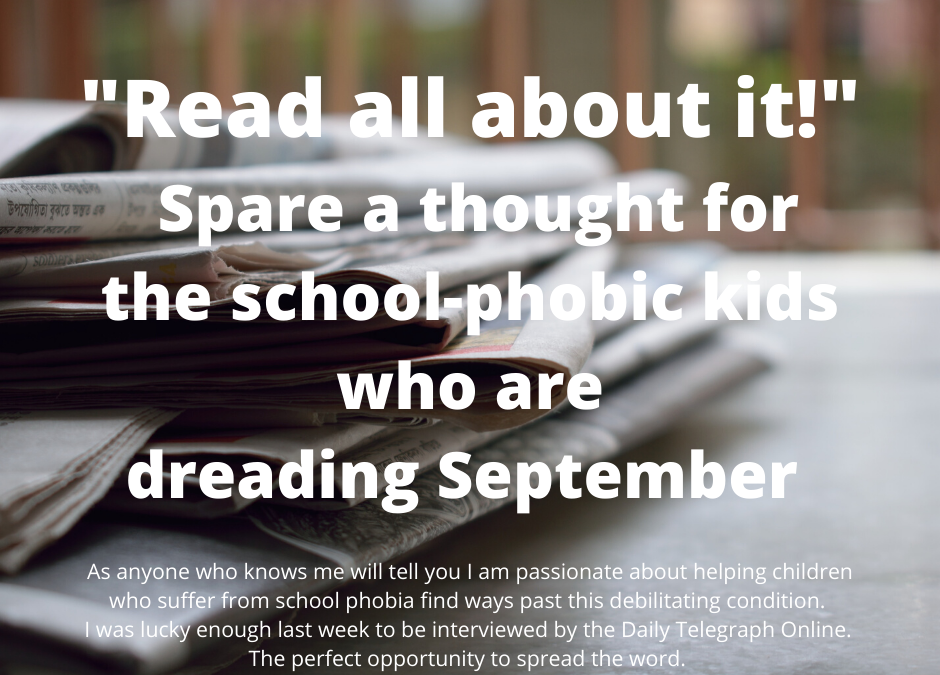As anyone who knows me will tell you I am passionate about helping children who suffer from school phobia find ways past this debilitating condition. I was lucky enough last week to be interviewed by the Daily Telegraph Online; a perfect opportunity to spread the word.
In the Daily Telegraph on July 1st 2020
Spare a thought for the school-phobic kids who are dreading September. Months away from the classroom means those children with a phobia about school will find it even harder to face the idea of going back. By Kate Olphert 1 July 2020
As parents celebrate the re-opening of our schools, my thoughts are with the children. Many will be excited to see their friends and teachers again. But others may find this autumn term a very difficult transition. There is one group of students in particular who will be genuinely terrified of stepping foot back into the classroom – the school phobics.
There are no figures for how many children today are classed as school phobic but as a former teacher and now a specialist coach for children with anxiety, I’d say every school in the UK has at least one child who suffers.
The stress it causes within families cannot be underestimated. I’ve seen marriages fall apart; families suffer financial pressures as parents give up a career to look after the child at home while mental health can deteriorate in other members of the family.
The signs are not always obvious that a child is suffering from school phobia. Many of those who are mildly affected, may suffer in silence and struggle on, while others repeatedly feel ill, vomit or have panic attacks.
Others will display aggressive behaviour, literally trying to fight their way out of their stressful situation.
For parents, every day is a battle to get their child into school.
Now that millions of children are set to return to the classroom in September after – in some cases – six months away, I foresee a huge rise in children suffering from this debilitating condition.
Like any phobia, it can develop insidiously over many months or years but the child will struggle on. But if an illness or injury means they have to spend several days or weeks out of school, some find themselves locked into what feels like life-threatening fear.
Post-pandemic, I feel there may well be a significant rise in the number children suffering from school phobia and requiring support and understanding.
I know only too well how they feel. When I was 13, after a short illness, I began struggling with going back to school. I missed more and more days and while my parents tried everything to get me to go in, a deep-rooted fear had developed within me and I couldn’t do it.
I hear again and again from the school refusers I work with now, that it’s not that they don’t want to attend school – this isn’t a choice – they simply can’t make themselves do it.
There’s a misconception that bullying is often the cause of school phobia but – as with my own experience as a child – it can strike totally at random and every case is unique.
Boys and girls are equally affected. I’ve worked with children as young as four and those in university. Children studying in private education are as likely to be affected as those in the state system. I’ve worked with a family paying three sets of school fees at once because they kept moving their child from school to school, thinking that would solve the problem. It didn’t.
Parents inevitably worry about their children and want to ‘fix’ the problem. They worry about their child’s non-existent education, that they are missing out on social interactions, becoming depressed and they are concerned as to whether their child will have any sort of future.
Add to that the fact that there is a legal requirement for children to attend school and that school and health professionals often have varying levels of understanding of this condition and it’s understandable why parents feel so much pressure.
But there are things that you can do as a parent which can genuinely help a school phobic child when they return in September:
1. Listen to what your child is telling you – just listen, don’t jump in and offer solutions. Believe them when they say they can’t go. Take it from me, having a panic attack related to school feels life-threatening. Stop fighting your child and stand beside them so that they can better fight their anxiety.
2. Wherever possible keep clear regular honest communication flowing with your child’s school or education authority. This isn’t about endless meetings and plans as to how to get your child into school. Simply keep everyone in the same loop. Do this before the start of the September term.
3. Don’t give up on your child and the idea that they can have a successful future. I can give you many examples, including myself, of people who have come out the other side and are successful, rounded, happy adults.
Kate Olphert, coach, advisor and mentor at groundbeneathyourfeet.co.uk, was speaking to Jill Foster


 Working with school phobic children and their families, I advise, mentor and coach. I introduce people to new ways of thinking about what is going on for them, talking openly and honestly about possibilities.
Working with school phobic children and their families, I advise, mentor and coach. I introduce people to new ways of thinking about what is going on for them, talking openly and honestly about possibilities.